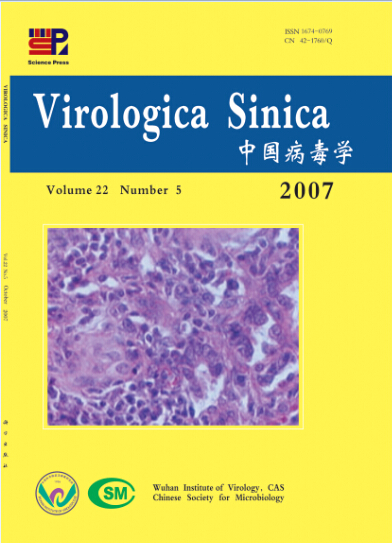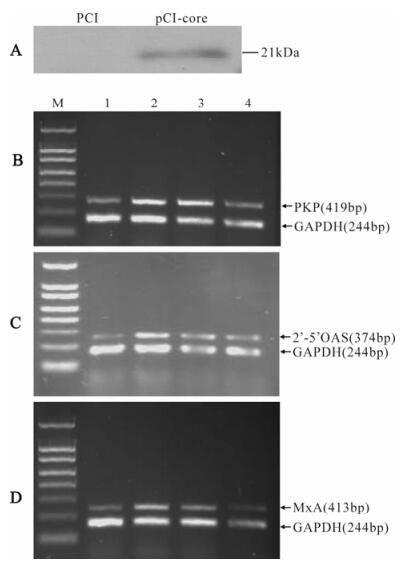-
1. Basu A, Meyer K, Ray R B, et al.2001.Hepatitis C virus core protein modulates the interferon-indued transacting factors of Jak/stat signaling pathway but does not affect the activation of downstream IRF-1 or 561 gene.Virology, 288:379-390.
doi: 10.1006/viro.2001.1100
-
2. Bisceglie D A. 1997. Hepatits C and hepatocellular car-cinoma. Hepatology, 26: 34S-38S.
doi: 10.1002/(ISSN)1527-3350
-
3. Ciccaglione A R, Stellacci E, Marcantonio C, et al.2007. Repression of interferon regulatory factor 1 by hepatitis C virus core protein results in inhibition of antiviral and immunomodulatory genes.J Virol, 81:202-214.
doi: 10.1128/JVI.01011-06
-
4. Foy E, Li K, Wang C, et al.2003.Regulation of interferon regulartory factor-3 by the hepatitis C virus serine protease.Science, 300:1145-1148.
doi: 10.1126/science.1082604
-
5. Fried M W, Shiffman M L, Reddy K R, et al.2002. Peginterferon alfa-2a plus ribavirin for chronic hepatitis C virus infection.N Engl J Med, 347:975-982.
doi: 10.1056/NEJMoa020047
-
6. Gale M, Blakely C M, Kwieciszewski B, et al.1998. Control of PKR protein kinase by hepatitis C virus nonstructural 5A protein: molecular mechanisms of kinase regulation.Mol Cell Biol, 18:5208-5218.
doi: 10.1128/MCB.18.9.5208
-
7. Kisseleva T, Bhattacharya S, Braunstein J, et al.2002. Signaling through the JAK/STAT pathway, recent advances and future challenges.Gene, 285:1-24.
doi: 10.1016/S0378-1119(02)00398-0
-
8. Lee C H, Choi Y H, Yang S H, et al.2001.Hepatitis C virus core protein inhibits interleukin 12 and nitric oxide production from activated macrophages.Virology, 279:271-279.
doi: 10.1006/viro.2000.0694
-
9. Naganuma A, Nozaki A, Tanaka T, et al.2000. Activation of the interferon-inducible 2'-5'-oligoadenylate synthetase gene by hepatits C virus core protein.J Virol, 74:8744-8750.
doi: 10.1128/JVI.74.18.8744-8750.2000
-
10. Ohkawa K, Ishida H, Nakanishi F, et al.2004.Hepatitis C virus core functions as a suppressor of cyclin-dependent kinase-activating kinase and impairs cell cycle progression.J Biol Chem, 279:11719-11726.
doi: 10.1074/jbc.M308560200
-
11. Ruggieri A, Murdolo M, Harada T, et al.2004.Cell cycle perturbation in a human hepatoblastoma cell line constitutively expressing Hepatitis C virus core protein.Arch Virol, 149:61-74.
-
12. Starr R, Willson T A, Viney E M, et al.1997.A family of cytokine-inducible inhibitors of signaling.Nature, 387:917-921.
doi: 10.1038/43206
-
13. Taniguchi T, Takaoka A.2001.A weak signal for strong responses: interferon-alpha/beta revisited.Nat Rev Mol Cell Biol, 2:378-386.
doi: 10.1038/35073080
-
14. Taylor D, Shi S, Romano P, et al.1999.Inhibition of the interferon-inducible protein kinase PKR by HCV E2 protein.Science, 285:107-110.
doi: 10.1126/science.285.5424.107
-
15. Walsh M J, Jonsson J R, Richardson M M, et al.2006. Non-response to antiviral therapy is associated with obesity and increased hepatic expression of suppressor of cytokine signalling 3 (SOCS-3) in patients with chronic hepatitis C, viral genotype 1.Gut, 55:529-35.
doi: 10.1136/gut.2005.069674
-
16. Zhu H Z, Nelson D R, Crawford J M, et al.2005. Defective Jak-stat activation in hepatoma cells is asso-ciated with hepatitis C viral IFN-α resistance.J In-terferon Cytokine Res, 25:528-539.
doi: 10.1089/jir.2005.25.528












